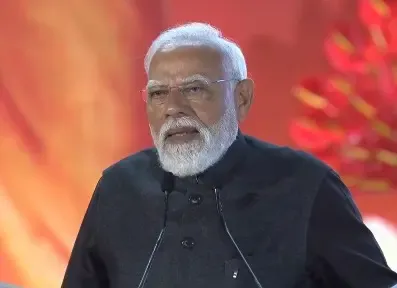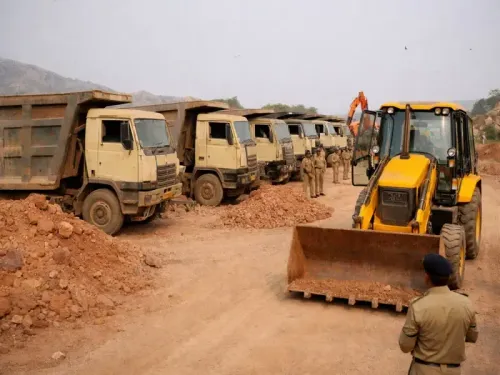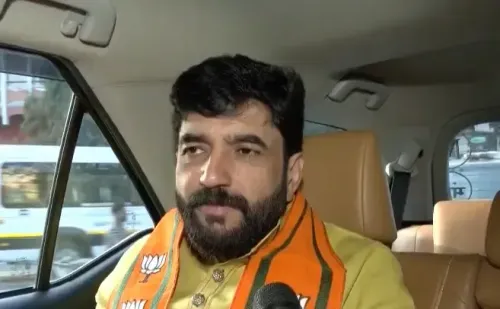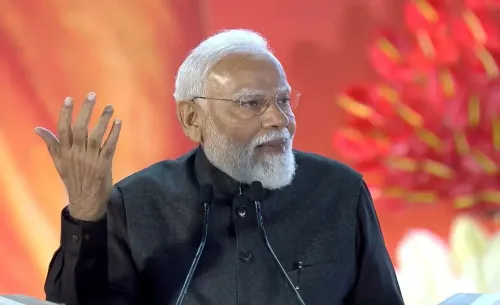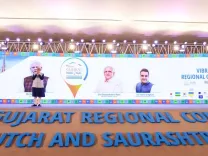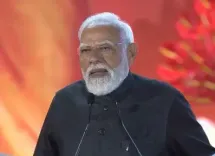What Did PM Modi Say on RSS Centenary Celebrations?
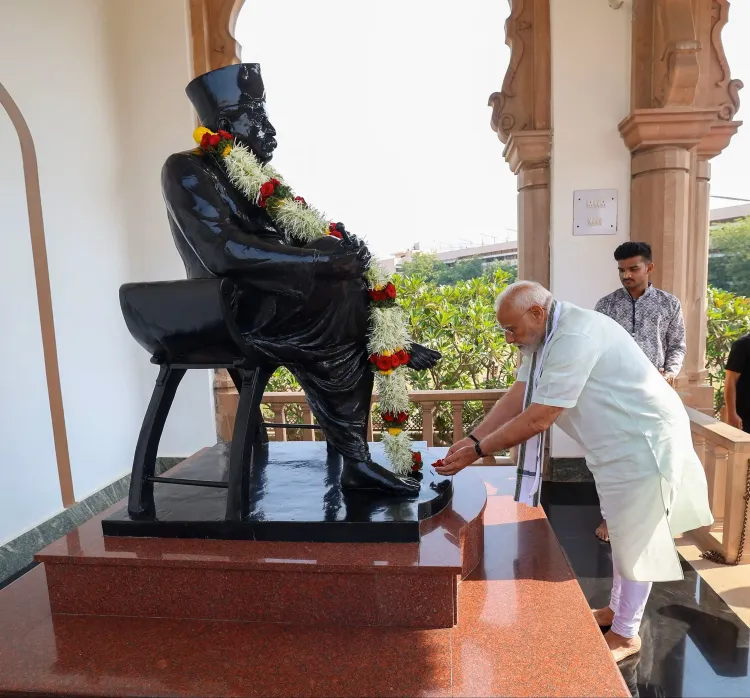
Synopsis
Key Takeaways
- RSS's centenary reflects a rich history of service.
- Nation-first philosophy guides its mission.
- The 'shakha' fosters personal transformation.
- Social justice remains a priority for the RSS.
- Modern challenges necessitate unity and resilience.
New Delhi, Oct 2 (NationPress) On the momentous occasion of the Rashtriya Swayamsevak Sangh's (RSS) 100th anniversary celebrated on Vijayadashami, Prime Minister Narendra Modi acknowledged the dedication of the Swayamsevaks who have committed their lives to the vision of nation-building, emphasizing the principle of 'nation first'.
In an insightful blog entry, the Prime Minister remarked, "A century ago, during the revered occasion of Vijayadashami, the RSS was established. This was not merely the inception of a new entity, but rather a rejuvenation of an ancient tradition, wherein India’s eternal national consciousness manifests in various forms to tackle contemporary challenges. In our era, the Sangh represents that enduring national consciousness. We, the current Swayamsevaks, are fortunate to witness the centenary of the Sangh."
He conveyed his greetings to the Swayamsevaks and honored the RSS founder, Dr. K.B. Hedgewar.
Comparing the Sangh's journey to rivers that nourish every land they traverse, PM Modi stated, "A similar phenomenon has unfolded in the Sangh's evolution. Through its numerous affiliated organizations, the Sangh operates across all spheres of life including education, agriculture, social welfare, tribal welfare, women's empowerment, and beyond. Despite their varied fields of focus, they all embody a singular spirit and commitment: 'Nation First'."
Emphasizing the RSS' mission, he added, "Since its inception, the Sangh has dedicated itself to nation-building. To achieve this, it adopted a path of character development. Vyakti nirmaan se rashtra nirmaan (nation-building through character-building) has been the Sangh's guiding principle. For this purpose, it established the unique, simple, and enduring framework of the daily 'shakha'. The 'shakha' serves as an inspiring environment where every Swayamsevak transitions from 'I' to 'We', undergoing a profound personal transformation.
He further noted that the foundation of the Sangh's century-long journey is rooted in a national mission of personal transformation and the 'shakha' tradition, which has shaped countless Swayamsevaks, driving India forward in multiple domains.
Reflecting on its historical significance, the Prime Minister remarked, "From the moment of its founding, the Sangh has regarded the nation's interests as its own. Param Pujya Dr. Hedgewar Ji and many Swayamsevaks actively participated in the freedom movement. Dr. Hedgewar Ji himself was imprisoned several times. The Sangh also provided crucial support and protection to numerous freedom fighters."
He acknowledged that post-Independence, the Sangh continued its work for the nation with patriotism and service.
The Prime Minister recounted the assistance the RSS provided to individuals during the Partition, natural disasters, and relief operations.
He emphasized that throughout its century-long existence, the RSS has ignited self-confidence among all societal segments, reaching even the most isolated tribal areas. He praised organizations like Sewa Bharati, Vidya Bharati, Ekal Vidyalayas, and the Vanvasi Kalyan Ashram as vital empowerment pillars for tribal communities.
Discussing the Sangh's efforts against social injustices, he wrote, "For centuries, social issues like caste discrimination and untouchability have plagued Hindu society. From the time of Dr. Hedgewar Ji to the present, every Sangh member, every Sarsanghchalak, has actively opposed such discrimination."
"Param Pujya Guruji consistently propagated the principle of 'Na Hindu Patito Bhavet', meaning 'no Hindu can ever fall'. Pujya Balasaheb Deoras Ji stated: 'If untouchability is not wrong, nothing else is wrong in the world.' Later, Pujya Rajju Bhaiya Ji and Pujya Sudarshan Ji continued to champion this message."
"In today's context, the current Sarsanghchalak, respected Mohan Bhagwat Ji, has issued a clear appeal for unity, advocating for one well, one temple, and one cremation ground for all," he added.
Addressing modern challenges, the Prime Minister stated, "When the Sangh was founded a century ago, the struggles and needs of the time differed from those we face today. As India progresses towards becoming a developed nation, we encounter new challenges, including dependence on foreign nations, attempts to disrupt our unity, and demographic changes due to infiltration. Our government is actively countering these threats. I am pleased that the RSS has also formulated a concrete roadmap to tackle them."
He mentioned the Sangh's 'Panch Parivartan', which provides a framework for Swayamsevaks to confront present-day issues—Sva-Bodh (self-awareness to abandon a colonial mindset and adopt Swadeshi), Samajik Samrasta (social harmony and justice focusing on the marginalized), Kutumb Prabodhan (reinforcing family values), Nagrik Shishtachar (instilling civic responsibilities), and Paryavaran (environmental conservation for future generations).
"With these commitments leading the way, the Sangh embarks on its journey into the next century. In the mission to build a Viksit Bharat by 2047, the Sangh's contribution will be vital. Once again, I extend my warm wishes to every Swayamsevak," the Prime Minister concluded.


